Better adapted training for international solidarity actors
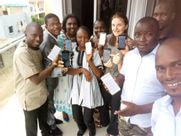
One of the main aspect of the work carried out by CartONG since its creation in 2006 has been to promote capacity building within the aid sector, particularly in the field of Information Management (IM), which encompasses both GIS (Geographic Information System) and MDC (Mobile Data Collection).
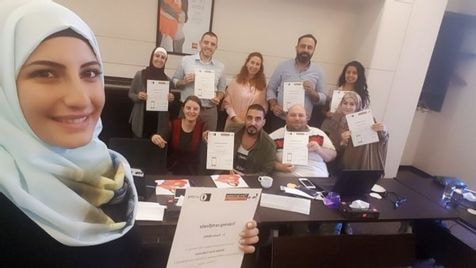
The year 2017 was marked by a major effort to scale up our training activities, particularly with one of our long-standing partners, Terre des hommes, for which the teams, in no less than 21 countries of intervention, were trained in MDC within 12 months. CartONG also worked to diversify its training formats, with, for example, the deployment of its first webinars to support UNHCR field teams in May 2017.
In line with this work, CartONG sought to increase the sustainability of its training portfolio in 2018 by focusing on an enhanced quality of content and the finest possible adaptation to the specific needs of each context and partner. We also paid a particular attention to creating opportunities for exchanges not only during but also after the training sessions had ended. As a result, 2018 was a year of further diversification of the training and technical support formats offered by CartONG.
Training humanitarian staff on how to manage data not just to use technical tools
CartONG has always sought to go beyond a purely technical approach in the training sessions it offers. The idea is not only to train participants in the use of a technical tool (whatever it may be), but also to ensure awareness of the transversal methodological aspects related to the use of the said tool.
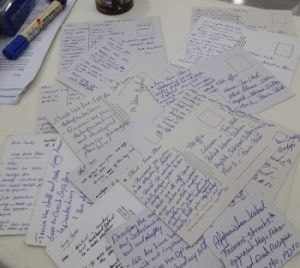
In 2018, CartONG thus generalized the integration of methodological aspects of M&E (monitoring and evaluation) and data protection as part of its MDC and GIS training courses. As such, the partners’ M&E focal points are regularly involved in the choice of training content. In addition, CartONG also approached several M&E organizations, such as Groupe URD, to discuss possible synergies between training courses in monitoring and evaluation, project management and information management. Systematically introducing basic M&E principles into information management training courses makes it possible to position IM tools as methodological supports for existing M&E methodologies, rather than showcasing them as tools that are disconnected from M&E methodological issues and challenges. It also helps limit the potential negative effects that their misuse could have on vulnerable populations.
In parallel with this logic, CartONG modulated its approach by proposing more advanced and participatory training formats for audiences with an established level of technical knowledge. Thus, after a first cycle of training in MDC in 2017 for Tdh teams, CartONG set up in 2018 advanced workshops in information management. These workshops were designed in such a way as to encourage horizontal skill transfers (between countries of intervention) and individualized approaches, encouraging participants to work on examples from their daily projects. The idea was to allow them to leave with concrete solutions for the problems they frequently encounter.
The Tdh IM workshop for the MENA region (Middle East and North Africa) allowed us to test this new format. At the end of the training week, participants were asked to write their own short and medium-term objectives on a postcard which was then sent to them to encourage the implementation of learning objectives and facilitate self-assessment.
Towards a sustainable training approach
CartONG seeks to provide post-training support for a few days – usually in the form of group exchanges that encourage collective emulation but also in the form of individual exchanges via Skype or email – at the end of each of the training sessions given in the field or remotely. The main challenge is to ensure the sustainability of the knowledge and approaches transferred – the implementation of technological tools often raising many questions. While this approach has been implemented for several years with CartONG’s main partners (UNHCR and Tdh in particular), the same cannot be said for more recent partnerships. In 2018, CartONG therefore sought to generalize the idea of 1 to 2 days of post-training support to all its partners, in order to promote the appropriation of knowledge and skills by field teams in the long term.
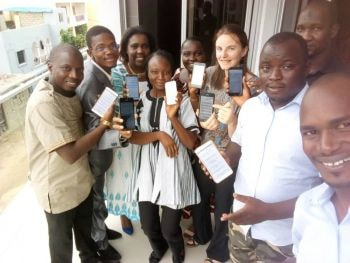
In order to offer the most sustainable training courses possible, CartONG also chose to offer revised formats of pre-existing training sessions, particularly in GIS and MDC. Thus, on three occasions in 2018, CartONG sent not one but two trainers to work with MSF teams in Europe for one week. These sessions conducted by a pair of trainers made it possible to offer a more personalized support to all participants and further opportunities for dialogue.
At the same time, CartONG also diversified its presence by conducting awareness sessions on GIS for a few hours during the annual thematic training courses given at MSF, with a diverse audience such as heads of mission, WASH, logistical and health specialists. This work was carried out as per MSF’s request with the underlining idea of institutionalizing GIS as a standardized working tool, involving not only GIS specialists and cartographers but all of the humanitarian profiles existing within the organization, whether based at HQ or in the field.
In a similar way, CartONG also seeks to encourage the implementation of inter-NGO training sessions, in order to impact a larger number of structures, pool training costs and promote dialogue and horizontal skill transfers between different actors in the sector. As such, CartONG gave its first field MDC inter-NGO training at the Bioforce Institute in Dakar in September 2018, in the presence of staff from 6 different countries and 5 different humanitarian organizations. The next training session is scheduled for May 20-24, 2019. Work to adapt GIS and MDC training to the ever-changing needs of the aid sector is also currently being discussed with the Bioforce training centre based in Vénissieux – in order to continue to offer the most relevant training sessions possible.
Pooling deployment costs between structures to offer more trainings in the field
As much as it is actually possible, CartONG always tries to share the costs of deployments between structures in order to be able to offer its partners’ field teams the support they need. Pooling travel costs between several structures makes it possible to carry out training activities that would otherwise be very difficult to finance. By applying this principle in 2018, CartONG was able to carry out a day of training with ACF teams in Dakar following a week of training given for MSF, and also to conduct a face-to-face working session with the Tdh delegation in Burkina Faso, following a deployment in support to UNHCR.
Adapting to the (actual) needs of field teams
In 2018, CartONG also sought to encourage a systematic assessment of the detailed needs of each partner in order to best adapt the relevance of the training to their field teams. Indeed, in the absence of specialized personnel at the local level, it is very difficult for coordination teams to accurately analyze the technical IM needs before requesting support. Moreover, without technical background, they may tend to primarily request support centered around technological needs, while quite frequently there are also methodological shortcomings to be considered. These must be addressed in order to offer lasting support to the partner and to avoid that the technical skills acquired during the training cannot be properly applied by teams in the field.
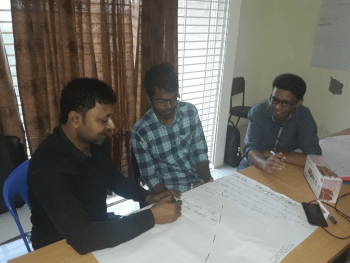
There are several remote ways to assess initial needs: online questionnaires, Skype interviews, a quick review of existing IM products, etc. However, in the context of intra-NGO projects, the ideal solution remains to carry out a needs assessment in the field. This is the option that was proposed to our partner Solidarités International in July 2018. Originally, 3 weeks of training for their team based in Bangladesh had been requested. However, given the complexity of the situation (team size, high turnover, etc.), CartONG preferred to propose a combined solution to accurately assess the information management needs of the team based in Bangladesh before starting training. This suggestion was approved and CartONG therefore firstly carried out an information management needs assessment mission to Bangladesh in August 2018, followed by 2 weeks of training in GIS, MDC and information management in November.
In some cases, adapting to the concrete needs of the field teams also implies the “individualization” of the proposed training formats and a switch to a more coaching-type approach. In October 2018, a CartONG staff was deployed in Kabul in support of our partner ACF France and its teams based in Afghanistan. For 3 weeks, he provided individualized – or in very small group – information management coaching to the MEAL (Monitoring, Evaluation, Accountability and Learning) team at ACF Afghanistan.
Personalized support, in concrete terms: what does that mean?
The “classic” collective training part was thus reduced to 2 days, in order to be able to focus on support adapted to the needs of each team member – in particular according to their initial skill levels since these were unequal. More specifically, this tailored support consisted of Q&A sessions, personalized exercises, exchanges on work in progress and an observation period on the workstation of each member of the MEAL team – all of which was received with very positive feedback. As Rafiullah Khan, co-head of ACF Afghanistan’s monitoring and evaluation department, points out, “CartONG played a major role for ACF Afghanistan. His team transferred his professional expertise and technical skills to support and strengthen the mission’s capabilities. In a short time, thanks to their efforts, the ACF AF MEAL department has been able to make dynamic changes and develop its use of MDC tools, data visualization, information management, and data protection policy”.
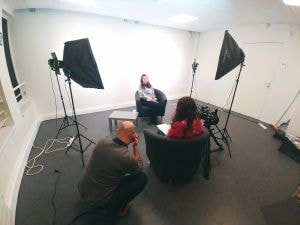
An approach to be carried on in 2019
While 2018 was marked by the diversification of support formats and the consolidation of training contents offered by CartONG, our teams do not intend to relent their efforts in 2019. CartONG recorded its first MOOC in January 2019, at the request of the National School of Geographic Sciences (ENSG). The publication of this online course on GIS is expected by the end of the academic year.
Additionally, this year, CartONG plans to offer inter-NGO training courses in France on the themes of MDC, information management and GIS. For more information on this subject or for any other training needs, please contact us.
* * * *
To learn more: what training activities do CartONG carry out each year in support of its partners?
- Every year, CartONG supports all its partners (MSF, UNHCR, Tdh, SOS Faim, Solidarités International, etc.) and their HQ and field teams through training and by providing coaching and advice, in order to make them more efficient and autonomous in their management of operational data.
- Since 2010, the NGO has also been regularly involved in the training programs of the Bioforce training institute to raise awareness about information management issues among future humanitarian actors.
- CartONG teams also carry out occasional awareness-raising actions with a more strategic focus. In 2018, this was notably the case during a MDC awareness day organized at AFD in December, and several workshops focused on data sharing as part of a field mission to Madagascar in support of PHF and the local OSM community, and as part of the “data collaborative” project in the DRC.